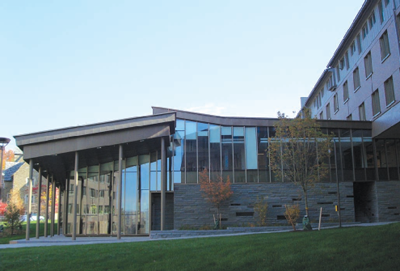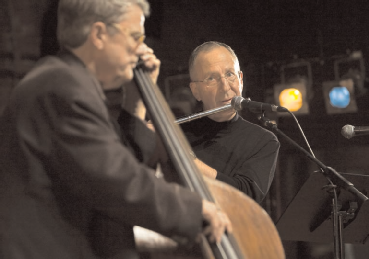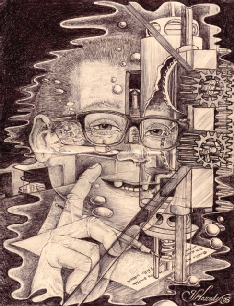A Rose for West Campus; Tisch Gift Battles Faculty Brain Drain; Night and Day (Hall); and more…

A Rose for West Campus: The September dedication of Flora Rose House marked the completion of the $225 million West Campus Residential Initiative. The project comprised the building of five residential halls and Noyes Community Recreation Center. The final house was named for nutrition professor Flora Rose (1874-1959), who helped found the College of Home Economics (now Human Ecology).
Fuchs Named 15th Provost
W. Kent Fuchs, a professor of electrical and computer engineering who has served as dean of the Engineering college since he came to Cornell in 2002, has been named the University's new provost. The appointment continues Cornell's long-standing tradition of hiring its chief academic officer from within. "He is a strong and respected administrator who has led the Engineering college with foresight, vitality, and innovation—attributes he will bring to his new appointment," said President David Skorton.
Fuchs came to Ithaca from Purdue University, where he headed the School of Electrical and Computer Engineering. He holds an undergraduate degree from Duke, a PhD in electrical engineering from the University of Illinois, and a Master of Divinity from Trinity Evangelical Divinity School. "We are blessed with wonderful leadership across the University," Fuchs says, "and I will devote all my energy and time to helping those leaders enhance Cornell's stature, scholarship, and teaching."
Fuchs succeeds Biddy Martin, Cornell's longest-serving provost, who was in the post for eight years before leaving last summer to become chancellor of the University of Wisconsin, Madison. He takes office January 1.
Tisch Gift Battles Faculty Brain Drain
In an effort to keep distinguished mid-career faculty from being lured away to other schools, trustee Andrew Tisch '71 and his wife, Ann, have given $35 million to endow the Tisch University Professorships. "Great teachers have changed our lives," said Tisch, co-chairman of the board of Loews Corp. The professorships, announced in September, will also be used to recruit new talent.
The gift comes at a time when baby-boomer professors are retiring rapidly; one-quarter of Arts and Sciences faculty have been hired in the last five years and the turnover is likely to accelerate. "These funds will be used energetically and strategically in areas of key importance to the University," said President David Skorton, adding that the professorships will create "an ethos of excellence."
The first to be awarded a Tisch professorship is Geoffrey Coates, professor of chemistry and chemical biology. "It's a real honor," he says. "It provides the sort of long-term, no-strings funding that will allow me to tackle big problems that I can't ordinarily do with short-term, more restricted funding. So it's a unique opportunity to be able to do the sort of science that I've always dreamed of."

Night and Day (Hall): President David Skorton jammed with jazz bassist Charlie Haden during the American Artistic Renaissance Symposium in September. The three-day event brought a roster of notable musicians, dancers, writers, and visual artists to campus to explore the lasting creative influence of the downtown Manhattan loft scene of the Seventies.
Alumnus Dies in Gorge
On October 9, authorities identified Jakub Janecka '98 of Lake Ariel, Pennsylvania, as the man whose body had been recovered the day before from Cascadilla Creek Gorge below the College Avenue Bridge. A 911 caller had reported that a man had jumped from the bridge. Janecka's death was described as "an apparent suicide" by Tommy Bruce, vice president for university communications. "We're always saddened by a tragic loss of life, regardless of the circumstances," said CUPD deputy chief Kathy Zoner. "Our hearts go out to the friends and family of this individual."
Ranking Goes Down . . . and Up
While the University fell two spots to fourteenth in U.S. News & World Report's annual college ranking, there was good news from across the pond: the British publication Times Higher Education placed Cornell at number fifteen in its QS World University Rankings, up from number twenty the previous year.
U.S. News also reported that high school guidance counselors gave Cornell high marks, rating it the fifth-best university overall for educating its students. It retained the top spot in applied and engineering physics for the fourth year in a row, with biological and agricultural engineering ranked second, and the engineering program as a whole ranked eighth. Other areas in which Cornell was recognized included its undergraduate business program (eleventh) and the economic diversity of its students (fourth).
University Gets Worker Nods
Cornell has earned the top spot in AARP's list of best employers for workers over fifty; it was one of only five universities to make the list. In putting the University in first place, AARP recognized Cornell's variety of health-related programs and flexible work schedules. And for the third consecutive year, the University made Working Mother magazine's list of the 100 best employers for working mothers, citing Cornell's efforts to create an inclusive environment via childcare, flextime, and leave provisions.
Qatar Dean to Retire
 Daniel Alonso, MD, dean of Weill Cornell Medical College in Qatar (WCMC-Q) since its founding in 2001, will retire in January. Alonso will become dean emeritus and continue to advise the Qatar branch, which graduated its first MDs in May. "WCMC-Q is in very good shape and is inspiring the next generation of doctors," he says. "We have met the important milestone of graduating the inaugural class, and the other two legs of our triple mission—research and patient care—are steadily progressing." Alonso has been at Weill Cornell since 1969; his previous post was senior associate dean for academic affairs. WCMC-Q psychiatry professor and deputy dean Javaid Sheikh, MD, will serve in an interim capacity during an international search for Alonso's successor.
Daniel Alonso, MD, dean of Weill Cornell Medical College in Qatar (WCMC-Q) since its founding in 2001, will retire in January. Alonso will become dean emeritus and continue to advise the Qatar branch, which graduated its first MDs in May. "WCMC-Q is in very good shape and is inspiring the next generation of doctors," he says. "We have met the important milestone of graduating the inaugural class, and the other two legs of our triple mission—research and patient care—are steadily progressing." Alonso has been at Weill Cornell since 1969; his previous post was senior associate dean for academic affairs. WCMC-Q psychiatry professor and deputy dean Javaid Sheikh, MD, will serve in an interim capacity during an international search for Alonso's successor.
Visiting Scholars
The University has appointed Peter Eisenman '54, BArch '55, to a two-year term as a Frank H. T. Rhodes Class of '56 Professor. Eisenman, a renowned architect whose recent work includes the University of Phoenix stadium in Arizona, will visit the campus for one week each year. Cornell has also named three new A. D. White Professors-at-Large to six-year terms. They are: Hélène Cixous, a prolific French author whose best-known work is The Laugh of the Medusa; Hans Föllmer, a German scholar who specializes in abstract mathematics and economic theory; and Denise Riley, a feminist literary scholar and poet from the U.K. White Professors visit the campus three or four times a year to engage in a variety of academic endeavors including public lectures, seminars, and informal discussions.
Queer Eye for the Elizabethan Guy
Two scholarly worlds that don't often meet—Shakespeare studies and queer theory—came together in ShakesQueer, a symposium held on campus in September to explore novel takes on sexuality in the Bard's works. The event, attended by two dozen scholars, centered around a forthcoming collection of essays edited by Madhavi Menon, associate professor of English at American University. According to English department chairman Ellis Hanson, the symposium offered a chance to look at the Bard's canon from a different angle, much needed since Shakespeare courses tend to explore the same themes semester after semester. Says Hanson: "Shakespeare is coming out in new and fabulous ways."
Lecturer Hurt in Freak Accident
Joanna Luks, a senior lecturer in French, was badly injured on October 12 after she was struck by a forty-five-pound weight being used by wrestlers doing exercises on Libe Slope. The rubber-covered, wheel-shaped weight was being carried during uphill sprints; after it was accidentally dropped, it rolled across the street and struck Luks, who was on Baker Staircase. She fell down the stairs and sustained multiple injuries—including a fractured skull, a broken jaw, and a collapsed lung—and had to be airlifted to Arnot Ogden Medical Center in Elmira. After the incident, athletic director Andy Noel told the Daily Sun, "We'll never do this exercise again. . . . This is one of those accidents that is so upsetting you make whatever adjustments you need to make." Luks is expected to recover from her injuries.
Truth and Consequences
Cornell has received a $50,000 grant from the Veritas Fund for Higher Education to establish a program to foster "intellectual diversity." The fund was created in 2007 by the conservative Manhattan Institute for Policy Research to offset what it perceives as liberal bias on many American campuses; it has distributed some $2.5 million to support centers at ten schools, including Brown, Dartmouth, and New York University. At Cornell, history professor Barry Strauss '74 will head the new Program on Freedom and Free Societies; he told the Daily Sun that he hopes to create "an academic program, non-partisan, open to all points of view, and with serious intellectual interest in studying freedom, its spread, and its defense." This will include guest speakers, seminars, and debates.
Some observers have voiced concerns about a program funded by an organization with a political agenda, but James Piereson, a senior fellow at the Manhattan Institute, told the New York Times that the Veritas Fund initiatives are political only in that they "work against the thrust of programs and courses in gender, race, and class studies, and postmodernism in general."
Tata Gives $50 Million for India Programs
A nonprofit led by prominent Indian industrialist Ratan Tata '59, BArch '62, has given $50 million to endow two programs on the Hill, President David Skorton announced in his State of the University address in mid-October. The funds, from the Tata Education and Development Trust, will be split evenly between the Tata Scholarship Fund for Students from India and the Tata-Cornell Initiative in Agriculture and Nutrition. Tata, a Cornell trustee, is chairman of Tata Sons, the holding company of the Tata Group, one of India's oldest and largest business conglomerates.
The scholarships, Skorton says, will help Cornell "welcome many more of the best and brightest Indian students in a manner that would make Ezra Cornell proud; that is, regardless of their financial circumstances." The agricultural initiative aims to improve productivity, sustainability, and profitability in the Indian food system while reducing poverty and malnutrition, says Alice Pell, vice provost for international relations. "Although the Tata fund will be used to address problems in rural India," Pell says, "the gift will also help us learn how universities can better contribute to development and poverty reduction in other parts of the world."
 Art of incarceration: A pen-and-ink drawing by Jeff Harnden, who is serving time on a rape conviction in California, is on display at the Big Red Barn's Behind Bars Prisoner Art Show. The show, running through November 27, is sponsored by the Durland Alternatives Library as part of its Prisoner Express rehabilitation program.
Art of incarceration: A pen-and-ink drawing by Jeff Harnden, who is serving time on a rape conviction in California, is on display at the Big Red Barn's Behind Bars Prisoner Art Show. The show, running through November 27, is sponsored by the Durland Alternatives Library as part of its Prisoner Express rehabilitation program.
Legendary Coach Ned Harkness Dies at 89
 In the history of Cornell hockey and lacrosse, there are two eras: Before Ned and After Ned. Nevin D. (Ned) Harkness, who died on September 19, transformed the University's performance in both sports, building his teams into national powerhouses. He was greatly admired by his players and greatly feared by his opponents.
In the history of Cornell hockey and lacrosse, there are two eras: Before Ned and After Ned. Nevin D. (Ned) Harkness, who died on September 19, transformed the University's performance in both sports, building his teams into national powerhouses. He was greatly admired by his players and greatly feared by his opponents.
Harkness came to the Hill from RPI and took over a hockey program that had never risen above mediocrity. The team won twelve games in his first year as head coach, nineteen in his second, and twenty-two in his third. Then, in the 1966-67 season—with a lanky goalie named Ken Dryden '69—the Big Red posted a 27-1-1 record and won the NCAA championship. Three years later, they captured another national title, going 29-0-0— the only undefeated, untied season by a college hockey team in the modern era. Not content with that, Harkness also coached Cornell lacrosse for three years, compiling a 35-1 record.
After his death, tributes poured in from his colleagues and former players. Dick Bertrand '70, tri-captain of the undefeated 1969-70 hockey team and Harkness's successor as head coach, said: "To this day, I've not met anyone like him as a man, a father figure, a model, and a coach."


